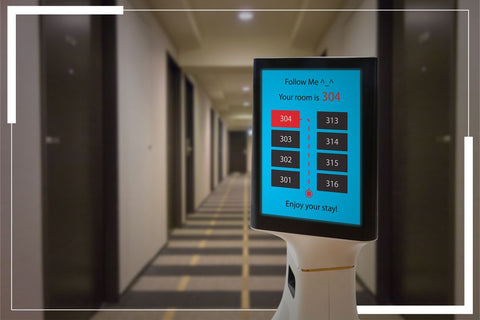By Steve Jarratt, Technology Writer

The advent of new technologies continues to have a dramatic impact on the hospitality business, from planning and booking via online sites to innovations like keyless entry, smart appliances, wireless charging and app-based guest services.
Technology continues to play an increasingly important role in enhancing the guest experience. Today’s travelers are increasingly tech-savvy; their homes are filled with Internet-connected appliances and security systems, and all manner of home entertainment from streaming services to connected games consoles. They want their hotel rooms to be just as ‘smart’.
- The future of hotel room design
- The rise of wireless charging furniture
- The tech challenges facing hotels
Core to this vision is the simple fact that people rarely leave home without their smartphones. The smartphone penetration rate in Europe is 77.64% [1]. In the US, it's 85%. While China (63%) and India (31%) might be lower, they are rising fast [2]. The modern phone and hospitality are inextricably linked - it’s now an indispensable tool for booking hotels and restaurants, navigating, settling bills, handling language problems, taking photos and, crucially, leaving instant reviews on TripAdvisor. One must support the other.
With this in mind, the smartest hotels know that access to technology is a key part of what guests want (and expect) from a modern hospitality experience. According to Statista [3], 24% of hoteliers across Asia, Europe and North America say that the primary goal for using technology in their hotels is to 'improve the guest experience', followed by to 'grow profits' (18%) and to 'future-proof the organization' (16%).
But this is just the tip of the iceberg. There are several key hotel technology trends that will impact the hospitality business in 2022 and beyond. Let’s start with...
1. Continued digitalization of the guest experience
The global pandemic forced many hotels to go contactless, offering things like mobile check-in, keyless entry and online concierge services. And even though the threat of COVID is subsiding, many travelers still favor contact-free engagement. In a telling survey by Metova [4], nearly 90% of respondents said they’d prefer a hotel if it had a mobile app so they could manage their stay without any personal interaction. While 86% said they would choose one hotel over another if it had the option of a fully contactless check-in system.

Robots could be deployed in hotels as part of a contactless check-in experience.
Indeed, many companies are looking to shed some of their workforce in favor of these automated systems. A survey by Operto found that the majority of operators were looking to automate operations with a reduction in – or even complete removal of – front desk staff. More than half of those polled cited contactless check-in and keyless room entry as their highest priorities over the next two years. [5]
2. Going ‘mobile first’
As the name suggests, going ‘mobile first’ means designing something specifically with mobile technology in mind. So, a hotel’s website and booking systems need to be more than mobile-friendly – with support for search and booking by voice, an increasingly popular way of interacting with the Internet.
A natural extension of the self-service idea above is the provision of a dedicated hotel app, which can be downloaded to a guest’s phone. Such an app can accommodate functions such as check-in, keyless entry and room service ordering. The World of Hyatt app [6], for example, enables you to confirm your room preferences, select your check-in time, choose housekeeping options and act as a digital room key. In the future, apps will also help to replace paper documents, maps/manuals and perhaps even TV remote controls. They can be used to up-sell goods or services via a rewards program.
3. Wi-Fi 6 and 5G connectivity
5G is the fifth generation of mobile broadband and it will eventually replace existing 4G networks. Then there’s the next step in the evolution of wireless networking - Wi-Fi 6.
5G isn’t necessarily that big a deal for hotels, although its incredible speed will make using apps and services much faster for guests with 5G-enabled phones. Faster mobile broadband connectivity could also usher in an era of intelligent connectivity, powering artificial intelligence solutions like facial recognition, hotel robots, VR and AR delivery, even cloud gaming. Many of these technologies are already being deployed in high-end hotels in the Far East. [7]
For most establishments, Wi-Fi 6 is more immediately beneficial. It’s about 30% faster than the current Wi-Fi standard. But the real advantage is its ability to handle a greater number of users at once. Not only will guests enjoy a faster, more stable connection with Wi-Fi 6, the technology can play a major role in supporting smart devices across the hotel, such as thermostats, wireless speakers and security devices.
4. Smart rooms and smarter systems
The move towards ‘smart rooms’ marches over onwards, and it’s no longer enough to just have a smart TV with multiple language channels and a USB port to accommodate guests’ streaming devices. In Operto’s questionnaire, smart home devices and in-room tablets came high on the list of items that were of most importance to operators and, they believed, their guests.
In the not-too-distant future, guests might also begin to expect things like voice control, smart controls for heating and air conditioning, facial recognition for room access and security, smart mirrors with information feeds, and concierge video chat.
This trend also extends to predictive smart systems, which enable hoteliers to gather and analyze statistics [8]. In turn, this enables them to remove business bottlenecks, assess guest habits and forecast their needs and preferences – such as the ideal room temperature, the best time to send special offers, and so on.
5. Sustainability and carbon footprint
Post COP26, and with a focus squarely on the environment, reducing carbon footprints and going ‘net zero’ is the new 'going green'. In fact the UN is already working with the global hospitality sector to help reduce its carbon footprint by 90% by 2050. [9]

The Brandstand CubieBlue is a multifunction charging alarm clock, designed specifically for hotels.
Travelers are actively seeking out eco-friendly companies with green credentials. And there are lots of ways hotels can reduce their carbon footprints and act sustainably. Some options include: reducing throwaway plastic items in favor of reusable containers; letting guests opt out of daily room cleans and towel washes; offering more vegan and meat-free dishes; monitoring water usage; and sourcing foods from local suppliers [10].
6. Improved in-room charging
The use of smartphones and tablets when traveling cannot be understated. Stats from hotelspeak.com [11] reveal that 85% of international tourists carry a mobile device with them; 76% of travelers say their smartphone is their most important travel companion; while 65% of guests are online within seven minutes of checking in.
Elsewhere, a revealing Openkey survey [12] said that 88% of respondents “expect device charging ports.” Not ‘want’, but ‘expect’. Hotels aren’t just catering for people, they are increasingly catering for their equipment too. It’s why hotels are looking to deploy stylish, durable and user-friendly technology that's capable of charging multiple devices.
A guest with a fully charged phone (or tablet, laptop, camera, games console, portable battery…), is a happy guest. The technology experience of a hotel is just as important as the comfort and quality of its fixtures and fittings. The move toward an online, always-connected guest is well under way, and hotels that don’t embrace smartphones and tablets could quickly be left behind, buried under a pile of negative TripAdvisor reviews.
Want innovative power and charging products designed specifically for the hospitality industry? Discover how Brandstand can make a powerful difference.
Other posts you might like:
- The future of hotel room design
- The rise of wireless charging furniture
- The tech challenges facing hotels
References:
[1] https://www.statista.com/topics/3341/smartphone-market-in-europe/#dossierKeyfigures
[2] https://newzoo.com/insights/rankings/top-countries-by-smartphone-penetration-and-users/
[3] https://www.statista.com/statistics/1250334/key-reasons-hotels-use-technology-worldwide/
[4] https://metova.com/infographic-survey-tech-supported-new-normal-hotels-covid-19/
[5] https://operto.com/hospitality-industry-trends/
[6] https://world.hyatt.com/content/gp/en/rewards/mobile.html
[7] https://carrier.huawei.com/en/success-stories/Industries-5G/5G-Smart-Hotel
[8] https://codedesign.org/think-ahead-top-5-trends-hospitality-brands-2022
[9] https://unfccc.int/news/un-works-with-global-hotel-industry-to-reduce-emissions
[10] https://www.socialtables.com/blog/hospitality/hospitality-industry-trends/
[11] https://www.hotelspeak.com/2019/05/the-top-30-mobile-marketing-stats-for-hotels-in-2019/
[12] https://www.openkey.co/guest-expectations-for-hotel-tech-in-2019-2/




